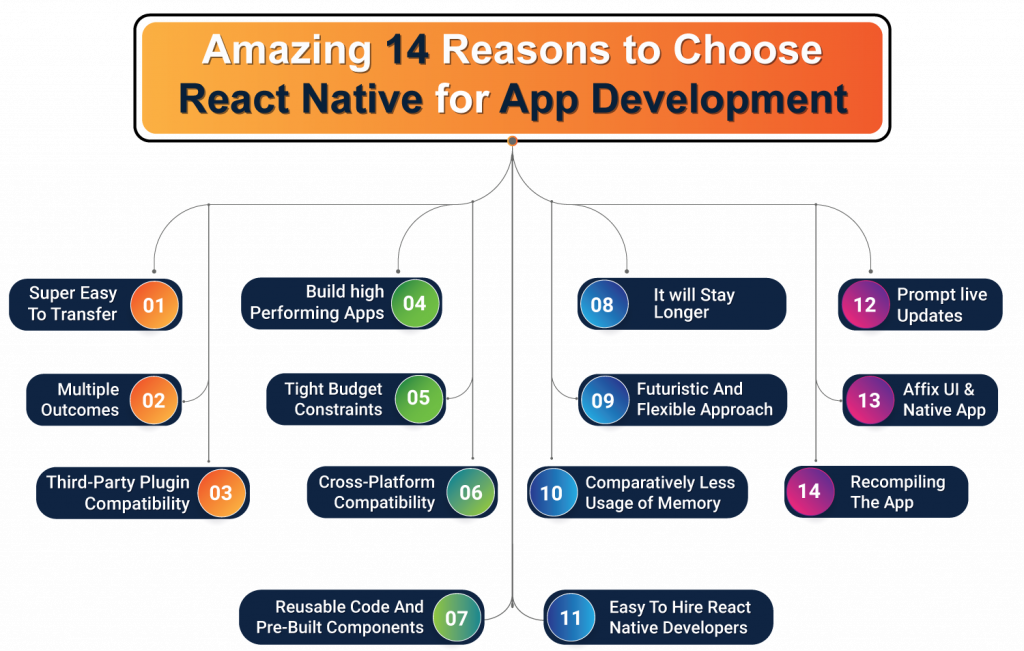In the booming technological world, applications have captivated the market. App development has never been easier. It is always the prime question as to what platform to choose & which app will be most acceptable for the businesses? There are so many mobile app development frameworks available and React Native is one of them.
This is when Google’s paramount app development option came into play i.e., React Native. The programming language has blown away the app development market. It is among the huge technological advancement and conquered many development verticals. Thus, it becomes necessary to discuss the reasons for choosing React Native for app development. Read out all the information carefully.
Table of Contents
ToggleWhat is React Native?
React Native is among the top-notch open-source framework that is utilized in building mobile app & web apps. Facebook had created React Native. Simultaneously, JavaScript is the key programming language of React Native. The engineers utilize this due to its effectiveness and multiple qualities like decreasing development time or upscaling the performance of cross-platform apps.
By using a single code base, React Native offers you to build fully functional apps in much less time on both Android and iOS platforms. You don’t need Java for Android and Swift for iOS. React Native discards the requirements, and the companies don’t need to hire two separate panels of developers to manage two different base codes.
Big brands like Facebook, Pinterest, Tesla, Instagram, Skype, Vogue, UberEats, Bloomberg, delivery.com, Bloomberg, and many more companies use this framework.
How Does React Native Work?
React native leverages programmers to develop applications by shuffling up JS threads that interpret JavaScript code, by building a native bridge between the app and the set platform.
Why Should You Rely on React Native for App Development?
We have already discussed, what React Native is and how does it work? Now, it’s time to analyze, why you should choose React Native for app development.From myriads of reasons, here we have shared the top 14 reasons to choose React Native for app development over other app development. Let’s get started!
Amazing 14 Reasons to Choose React Native for App Development

Here are the best 14 reasons for choosing to react to native app development over others. The framework is a cross-platform open-source platform and offers high-end functionality and power-packed applications. If you are looking for an app with a single code base and sustainable performance then definitely React Native has got your back.
1. Tight budget constraints
The most concerning and significant factor is money when you start your business. In this tech-savvy market, timing is everything. One who develops first stays longer. Every startup wants a fast return to survive that is the reason to hire React Native developers. It will put less burden on your pocket and will save time. You will keep one step ahead of your competitors.
2. Cross-platform compatibility
React Native uses one codebase. It is an important advantage of React Native. It allows engineers to utilize the same code base to create Android and iOS apps. It shows the same level of performance as Cross-platform apps. You can design a mobile application for your kind of business within no time. There is no requirement for different languages such as Java, C++, or any other to create apps for both Android and iOS.All you need is an app developer that brings React JS with a native UI library, native APIs, and a cross-platform or hybrid mobile app development for constructing the code base of one application that can run on both platforms i.e., Android and iOS.
3. Multiple Outcomes
The React Native app development allows performing complex tasks using simple codes. React Native works on Facebook’s UI library to make more straightforward codes for executing and implementing ReactJS development. React Native has a feature called ‘Live to reload’ that allows users to make corrections and operate on real-time code changes while the app is loading.
4. Affix UI & Native App
UI can look like JavaScript and less of a framework itself in this way. It is a pattern used to simplify the process that makes UI work in a smoother manner. The outcomes will be high-end and quickly responsive. It will build mobile apps without complexity.
5. Recompiling the App
This open-source framework uses the same base code for Android and iOS. It’s like deploying the same app for all mobile operating systems. You can recompile the app easily without any changes in the framework at any level.
6. Super Easy to Transfer
React native overlays with fragmented modules and intuitive code and make it easy to understand the code sequence by any developers. There is no need for the core developer team to keep accessing the app. Any situation does not change the development of the app.
7. Comparatively less usage of memory
React Native provides smoother run-time with the help of 3rd party plugins and React Native tools. The framework is made easy with its well-diversified modules and the 3rd party involvement. This phase gives a faster response due to its direct link with app outcomes features. The React Native uses much less memory space for Android and iOS platforms because it doesn’t require the cross-bridge link, and codes are used during run-time.
8. It will stay longer
React Native is not going to eradicate anytime soon. It will continue for more and more decades to come. It is hard to resist by any developer due to its timely assorted framework and user-friendly manual. In a very short time, it covered the market of app development. Facebook will make sure that it will stay longer in the market. With each passing time, React Native is upgraded and tries to solve more and more problems as much as possible. React Native makes it happen that you can create simply anything. There is no need to learn different languages and create complex codes.
9. Futuristic and flexible approach
A single code of React Native is enough to remove bugs and develop it with a framework that has interfaced with Android and iOS. Due to its simple framework, this will stay in the market for a long time. Most tech giant companies use this, to make it more reliable and responsive.
React Native app development is a platform where you can keep tabs on memory spacing and make applications more efficient. Developing the Android and iOS app under the same code enhances its features.
Many times it happens that a person drops out of the project, and the project is left incomplete. But now there is no worry about it. React Native solves this problem. Due to its simple language, any developer can learn it with less effort and also be able to finish incomplete projects. you can get your app in less time and in less money.
10. Easy to hire React Native developers
React Native is an open-source platform that uses the open-source JS library. So it’s not hard to find developers for your project. The code of React Native is simple and easy to understand and helps the developers to handle it in no time.
11. Build high-performing apps
React native is the best option when an app is built from scratch. Adding a single view or user flow to existing native applications also works well. You can add new React Native-based features, views, screens, etc. With a few steps. It helps you deliver a better-performing app.
Let’s Discuss Your Project
Get a free consultation and let us know your project idea to turn it into an excellent digital product.
GET A FREE CONSULTATION12. Reusable code and pre-built components
React Native allows you to reuse the written code for both Android and iOS apps. It follows the same principle as Cross-platform mobile app development. It follows the idea that “write once and launch everywhere.”
Now, developers don’t have to build different designs for different platforms. A single code is enough for all platforms. It adds relief to the developers.
13. Prompt live updates
The primary language of React Native is JavaScript. The developers can release updates without going through the App Store. It can launch updates instantly to a user’s device with tools like code push and has support for Cross-platform app development.
14. Third-party plugin compatibility
It is difficult to develop new software for any mobile application. But with the help of React Native, it becomes easy. Facebook manages React Native and has a wide range of JavaScript libraries. With the use of these plugins, you are able to make high-performing apps.
Cons of React Native App Development
We have seen above the positive qualities of React Native app development. Now it’s to see some cons of React Native.
The followings are the cons of React Native:
1. If any developer wants to create games or applications with complex 3D rendering, then React Native is not an ideal choice for them.
2 .If your business deals with complicated designs or advanced interaction, React Native is not an ideal choice for you.
3. It is a young app development framework and has covered the market in a short period. But still, lots of updates are required in this framework. The performance is still lower than native.
4. To use any fancy features in-app, the developers will either have to create native bridges or wait until somebody in the RN community comes up with a solution.
React Native App Development services
Hire Dedicated React Native App Development Company for Your Next Project
Request A QuoteIs React Native Good for Your Project?
React Native is a good choice for your project. If you see the pros and cons of React Native, you will see the pros of React Native has more weight. It has a future in cross-platform app development.
The reasons behind it are:
1. You can develop your app for both Android and iOS.
2. It will save money and time.
3. It can speed up the development process because it has many open-source libraries of pre-built components.
4. The developers will spend less time on testing.
5. You don’t need a large group of developers to develop your app.
6. You can build React Native applications cheaper and faster than native ones.
Conclusion
In the article, we discussed what React Native is, how it works, and the reason behind choosing it for the development of apps. We also mentioned the cons of React Native. We hope that the article will help you to understand and clear your concept regarding React Native.











